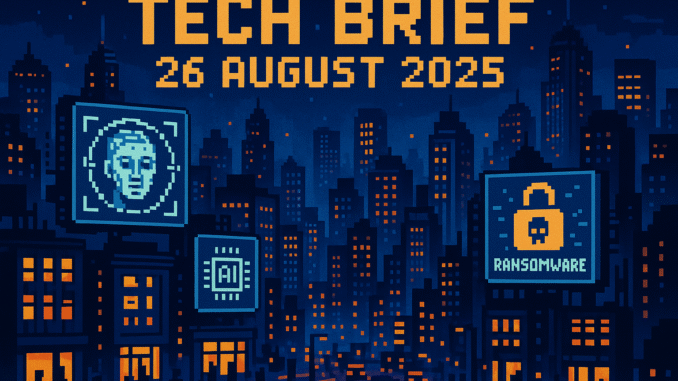
Tech Brief 26 August 2025 brings the week’s most pressing tech stories into sharp focus. Facial recognition at the Notting Hill Carnival, a proposed AI-for-all scheme, and a surge in ransomware attacks all remind us that innovation is never just about code or kit. Missed yesterday’s Tech Brief? Catch up here before diving in.
Facial Recognition at Notting Hill: Expert Rebuts Police Claims
“Bias-free?” Not so fast, says a leading British facial recognition expert. The Metropolitan Police are planning their biggest live facial recognition deployment yet at Notting Hill Carnival, but claims that the system is free of bias are being challenged head-on. The academic critic points out the underlying study used sample sizes too small to meaningfully prove fairness regarding race, gender, or age.
The police’s assurances sound suspiciously similar to the claims that accompanied the first rollouts of street CCTV back in the 1990s. We all remember how those early cameras sparked debates in every high street and living room. Proof once again that institutional memory can be short.
For those invested in fair technology, the dispute isn’t over the value of innovation, but over how, and for whom, these decisions land. If bias exists in the source code or training data, it will echo in every scan. As the crowds gather in west London, there’s more at stake than just image processing.
Government Eyes £2 Billion Deal for Universal ChatGPT Plus
What happens when the government flirts with the idea of purchasing premium AI access for everyone in the country? UK Tech Secretary Peter Kyle and OpenAI boss Sam Altman are discussing a possible £2 billion national licence for ChatGPT Plus, following whispers that Britain wants to jump ahead in the artificial intelligence queue.
It sounds bold, a leap comparable to the BBC Computer Literacy Project of the 1980s. Except this time, there’s no beige box, just the promise of an AI in every digital pocket. Questions about digital equity, vendor lock-in, and the speed at which policy can keep up with AI development are already swirling.
If you’re wondering how this fits with the earlier surveillance story, think about who controls the gatekeepers and the guidelines. When technology at this scale rolls out, the real-world consequences are rarely as tidy as the press releases make out. Britain’s next digital leap may look radically different from anything we’ve seen.
Ransomware Surges: 2025 Attacks Triple Over Previous Year
Ransomware attacks in 2025 have nearly tripled compared with 2024. For businesses, this means a permanent state of digital siege. Just six months into the year, security analysts are clocking the sharpest rise in criminal cyber campaigns seen since WannaCry paralysed NHS systems back in 2017.
The scale and sophistication have changed. Attacks now combine social engineering tricks with automated network scans and multi-stage code, so defenders must respond in real time. One practitioner put it matter-of-factly: “It’s not a question of if you’ll be targeted, but how soon, how hard, and how many times.”
Despite the headlines, some responses still feel rooted in 1990s thinking. Businesses build fortress-like firewalls but overlook the simple stuff: patching, password rotation, user training. As ransomware groups swap floppy disks for crypto wallets, it seems bad actors are the only ones sticking to regular upgrades.
From the Wayback Machine
On This Day: 1961 – Construction Begins on the Post Office Tower
Workers began pouring concrete for the UK’s then-tallest building, the Post Office Tower in central London. Architect Eric Bedford designed its core as a concrete cylinder, with a 90-foot square raft buried deep underground for stability. When finished, it could carry 160,000 simultaneous calls and 40 TV channels. The tower became a proud symbol of British engineering and connectivity, bridging homes and cities in a wave of mid-century optimism. Today’s cellular and fibre networks are direct descendants of this concrete and steel ambition.
Today’s Big Question
How do we measure technology’s value for society when every leap forward, whether surveillance, AI at scale, or online protection, arrives tangled up with trust issues? The Tech Brief 26 August 2025 doesn’t offer neat closures, just plenty for the tech-curious to ponder.
Stay curious, keep your toolkit handy, and ask awkward questions wherever tech and people collide. Nostalgia can’t fix flawed systems, but it can help us remember why the details matter.
Missed yesterday’s Tech Brief? Catch up here

Leave a Reply